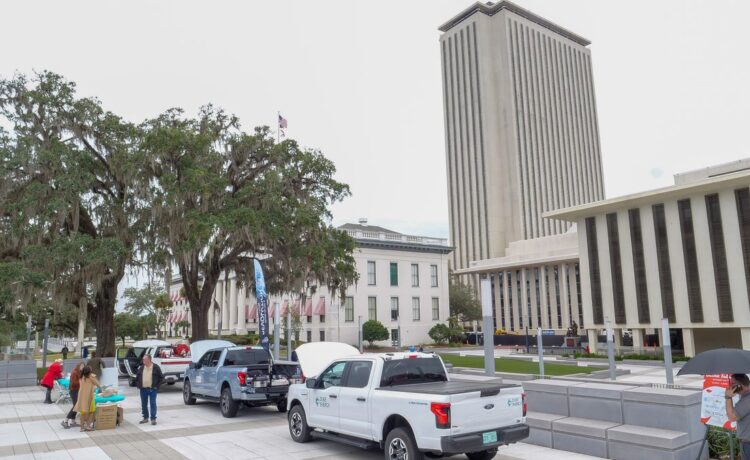Till lawmakers return, ‘I think the governor should play an extra round of golf,’ Sen. Jason Pizzo said. ‘And he should turn off his phone.’

Battles over guns, a budget and Hope in Florida politics: IFP
The Inside Florida Politics panel talks fallout from FSU shooting, friction between the governor and legislature and the impact Pope Francis’ death
- Florida’s legislative session extended to June 6th due to disagreements on a tax-break package and the budget.
- A tentative deal includes a $2.8 billion tax cut and a budget smaller than Governor DeSantis’s proposal.
- Tension remains between DeSantis and House Speaker Perez, with investigations into the governor’s actions continuing.
The 2025 legislative session unraveled amid an increasingly tense House-Senate clash over a massive tax-break package, a $4.4 billion gulf between budget proposals and outright animosity between Gov. Ron DeSantis and Speaker Daniel Perez.
But just two hours before lawmakers were set to adjourn the two-month session at midnight May 2, Perez announced the “framework” of a budget and tax-break deal.
“Good things come to those who wait,” Perez, R-Miami, told House members.
Still, the budget and tax-cut package agreed to by Senate President Ben Albritton, R-Wauchula, will force a lengthy extended session.
Lawmakers will have till June 6 to finalize their work. But they’ll return to the Capitol the week of May 12.
“It is better to get it right than to do it fast,” Perez said. “This will be a budget and tax cut that we can be proud of, a budget that honors the values of the Florida House.”
Albritton told the Senate, “Floridians can count on us to get the job done.”
The plan now calls for a $2.8 billion tax cut plan, including a $1.6 billion reduction in the state’s 6% sales tax, amounting to a modest shaving of around one-quarter of a percent. The spending plan also promises to come in under the $115.6 billion proposed by Gov. Ron DeSantis.
No other significant policy bills will carry over into the extended session. But with more work on the horizon, lawmakers exiting the Capitol will first have to cool off.
“I think that could take 15 minutes, or it could take a month-and-a-half,” said Sen. Jason Pizzo, NPA-Sunny Isles Beach.
Lawmakers will still have to patch over spending differences that divided them for the past two months. DeSantis’ chirping at the House, which he’s called “petty” and driven by “personal vendettas,” probably won’t help, many say.
“I think the governor should play an extra round of golf,” Pizzo said. “And he should turn off his phone.”
Budget now coming before July 1
Although the House and Senate are expected to finalize a state budget before the fiscal year beginning July 1 starts, peace between the House and DeSantis doesn’t appear likely. Lingering friction could hover over whatever behind-the-scenes talks occur between the House and Senate in coming days.
Perez already has pledged to continue a broad investigation of the governor’s actions in a number of policy areas, building on the House’s probe of the foundation linked to Hope Florida, First Lady Casey DeSantis’ social service initiative.
On the session’s 60th and final scheduled day, Perez also posed for a photo with right-wing agitator Laura Loomer, a conspiracy theorist and adviser to President Trump, who has his own awkward relationship with the governor.
On X, Loomer praised Perez, saying, “He’s doing a fantastic job holding @GovRonDeSantis accountable for the insurance crisis in Florida.”
Loomer was in Tallahassee a day after visiting Trump’s Mar-a-Lago resort for a fundraiser for U.S. Rep. Byron Donalds, R-Naples, whom the president has endorsed for Florida governor to succeed the term-limited DeSantis in 2026.
Loomer’s presence defies DeSantis
Casey DeSantis is thought to be considering a run. But the House’s examination of the Hope Florida Foundation has raised clouds.
The charity received $10 million connected to a Medicaid settlement, with most of the money funneled to other organizations that were helping the governor fight a marijuana ballot measure last fall.
The House’s investigation of Casey DeSantis has clearly infuriated her husband. And it’s fueled some of the pressure that sent the session spiraling off the rails.
“The House’s position has been, ‘Well, the governor has gotten everything he wants, so whatever he’s for, we’re against,’ ” DeSantis said during a recent appearance. “That’s why they’ve been running themselves ragged … this dysfunctional House of Representatives.”
The governor also told his supporters the House chose to “not focus on your issues, but to focus on the personal agenda of the leadership.”
A bad-blood back story
DeSantis and the House have been at odds for months. Perez clashed with the governor over his call for a special session in January, days after Trump’s inauguration, to ready the state for expected mass deportations.
It took three special sessions over a month for DeSantis and legislative leaders to reach an accord.
With the regular session starting in March, finalizing a state budget for the year beginning July 1 is the only legislation lawmakers really must approve, according to the state’s constitution.
But statistics from this session show a marked downturn in productivity as the big dollar disagreements stopped plenty of more routine issues from being settled.
Productivity? Down
Of the 1,823 bills filed this year, only 227 had passed the House and Senate, heading into May 2’s closing day – a 12% success rate.
A year ago, under different House and Senate leadership, 1,732 bills were filed and 313 were approved by both sides – an 18% level.
An extended session, with a limited number of matters to settle, should end in at least the appearance of agreement between Republican supermajorities in the Legislature and the GOP governor.
The House on the session’s final day launched the first meeting of the Select Committee on Property Taxes, which will work in coming months toward proposals to overhaul or eliminate local property taxes, aimed at the November 2026 ballot.
DeSantis has been clamoring for a property tax ballot item.
While the House may have gone farthest toward the governor in creating the committee, the Senate also favored giving state economists a shot at weighing possible changes in property taxes that voters would consider next year.
Albritton casts self as peacemaker, amid chaos
Albritton, the Senate president, had been trying to position himself as a peacemaker between the governor and the House.
But during the two-month session, there were too many titanic differences.
The House this session endorsed a $5.4 billion package of tax-cuts, centered on a 0.75% cut in the state’s 6% sales tax.
The Senate, wary of a national economy that is cooling amid Trump’s trade war, offered a more modest, $2.1 billion tax-cut plan that included eliminating the sales tax on clothing and shoes costing $75 or less.
With the framework deal now proposed, the House has come down a lot and the Senate went up some. Albritton has said that he’s concerned about giving away too much revenue in tax cuts. Economists already forecast sizable state budget shortfalls over the next two years.
“At the end of the day, I’m just not comfortable with a proposal that I believe will likely lead to shortfalls, if not substantial shortfalls, in the out years,” Albritton said before agreeing to a plan that permanently cuts $2.5 billion from state tax collections.
The session-long dispute over how much to cut taxes also stymied House and Senate efforts to agree on a spending plan for July 1. That now looks mostly resolved.
In looking to give more tax revenue back to Floridians, the House earlier crafted a state budget just under $113 billion while the Senate’s topped $117 billion.
Telegraphing the kind of hardline stances that led to the session’s impasse, Perez accused the Senate of “pathological overspending.”
“I appreciate the president’s talk on metrics and studies,” Perez said recently. “But all of that is code for, ‘Let’s spend money now and worry about how to save it later.’ ”
‘Later’ now becomes something of a coda for the session, now into a lengthy extension.
And lawmakers still have a lot to do. Later.
John Kennedy is a reporter in the USA TODAY Network’s Florida Capital Bureau. He can be reached at [email protected], or on X at @JKennedyReport.





